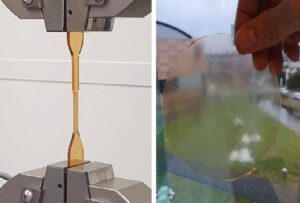
Dutch researchers develop strong, durable bio-based plastics
Canadian Plastics
Materials Research & DevelopmentThe technology reportedly overcomes the inherent low reactivity of bio-based secondary materials.

Tensile testing of the developed bio-based polymer (left) and a sample of polymer film (right). Image Credit: Van ‘t Hoff Institute for Molecular Sciences, University of Amstedam
Using building blocks that are already commercially available, researchers in the Netherlands have taken what’s being called “an important step” towards the production of fully bio-based, rigid polyesters.
A simple synthesis strategy used by the Industrial Sustainable Chemistry group led by Prof. Gert-Jan Gruter at the University of Amsterdam reportedly overcomes the inherent low reactivity of bio-based secondary diols, resulting in a polyester with good mechanical and thermal properties as well as a high molecular weight.
The research, described in the journal Nature Communications, was carried out with contributions from industry, notably Lego and Avantium. The toy company supported the project as part of the search for non-fossil alternatives for its plastic bricks. Avantium is interested in bottle and film applications.
In general, polyester plastics are synthesized from small dialcohol and diacid molecules, researchers said. These monomers are coupled in a condensation reaction, resulting in a long polymer chain of molecular building blocks in an alternating fashion. The material properties result both from the number of building blocks that make up the polymer chain, and from the inherent properties of the monomers. In particular, their rigidity is key to a firm, strong, and durable plastic. In this regard, the glucose-derived dialcohol isosorbide is unique among potential bio-based monomers. It has a very rigid molecular structure and is already industrially available.
But the problem, the researchers say, is that isosorbide is also unreactive, and in the past two decades it has proven quite challenging to obtain useful isosorbide-based polyesters. “It was nearly impossible to arrive at sufficiently long polymer chains (to achieve a certain ductility) while incorporating sufficiently high amounts of isosorbide (to arrive at a strong and durable material),” they said.
Daniel Weinland, PhD, first author of the paper in Nature Communications, and his colleagues found a solution by incorporating an aryl alcohol in the polymerization process. This leads to in situ, or on-site, formation of reactive aryl esters and a significant enhancement of end group reactivity during the final stage of polyester synthesis when the isosorbide’s low reactivity inhibits chain growth in traditional melt processes. As a result, high-molecular-weight materials could be produced with incorporation of high fractions of the bio-based, rigid secondary diol, even up to 100 mol%. For the first time, the researchers said, high-molecular-weight poly(isosorbide succinate) can be produced, the polyester obtained from isosorbide and succinic acid. The resulting strong plastics outperform existing plastics like PET in terms of heat resistance, an important attribute when washing re-usable bottles typically at 85°C, or 185°F. The isosorbide-based polymers also show promising barrier and mechanical properties that can outperform common fossil-based materials, the researchers added.
The novel polymerization approach described in the paper is characterized by operational simplicity and the use of standard polyester synthesis equipment. And it suits both existing and novel polyester compositions, and the researchers foresee the application of similar methods in other classes of polymers, such as polyamides and polycarbonates.
